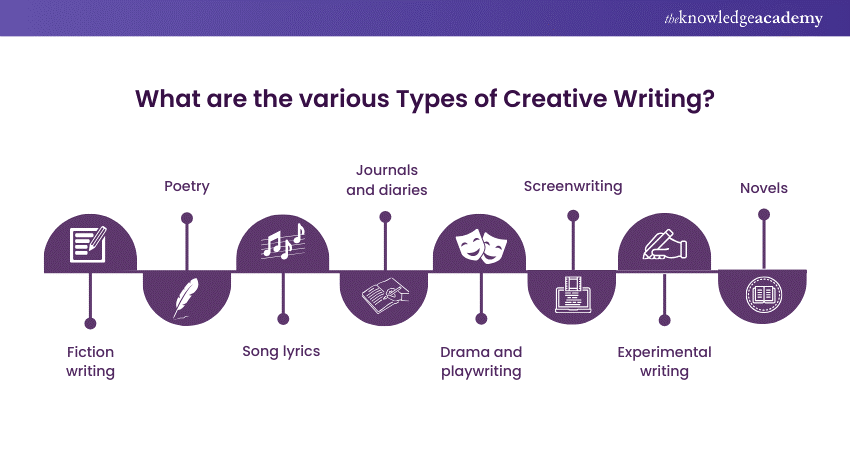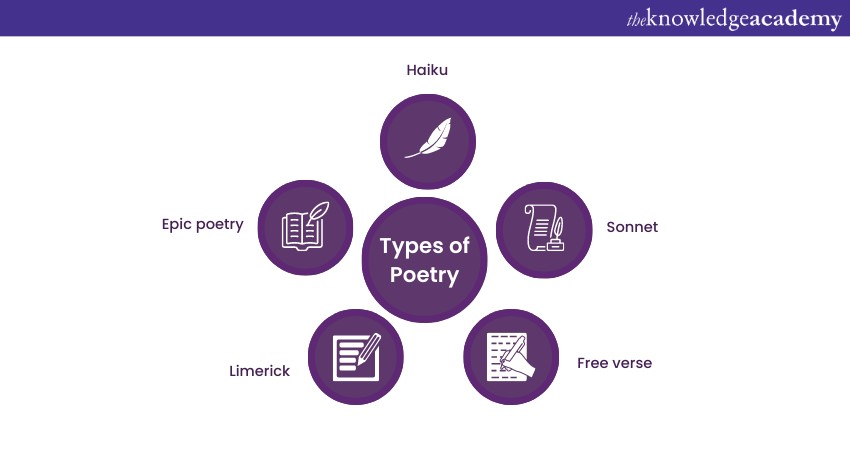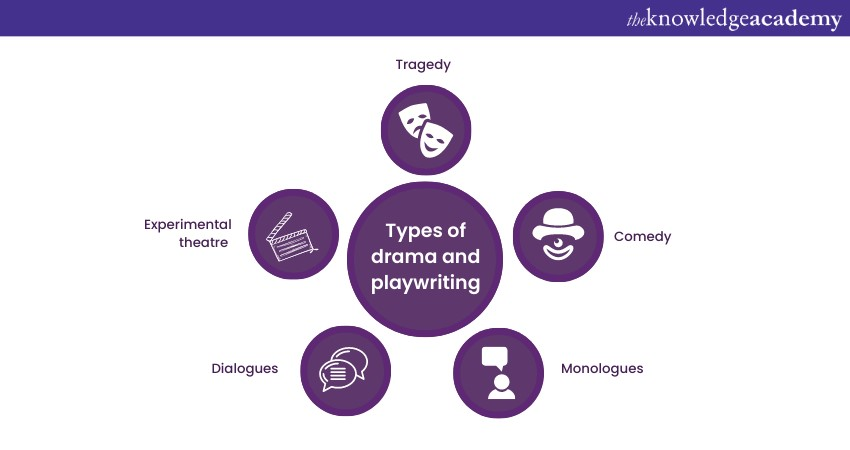We may not have the course you’re looking for. If you enquire or give us a call on +33 805638382 and speak to our training experts, we may still be able to help with your training requirements.
Training Outcomes Within Your Budget!
We ensure quality, budget-alignment, and timely delivery by our expert instructors.

Creative Writing is a diverse and exciting art that demands Writers to look into their imagination and express their thoughts in unique ways. From short stories to poetry, different Types of Creative Writing which cater to different styles and preferences. In this blog, we will delve into the different Types of Creative Writing, offering insights and examples to help you navigate the world of literary creativity.
Table of Contents
1) What are the various Types of Creative Writing?
a) Fiction writing
b) Poetry
c) Song lyrics
d) Journals and diaries
e) Drama and playwriting
f) Screenwriting
g) Experimental writing
h) Novels
2) Techniques used in Creative Writing
3) Conclusion
What are the various Types of Creative Writing?
Let’s discuss the various Types of Creative Writing:

Fiction writing
Fiction writing is one of the captivating Types of Creative Writing that transports readers into imaginary worlds, introduces them to memorable characters, and explores numerous emotions and themes. Within fiction, there are several distinct forms that Writers can explore to weave intricate tales. These forms include:
Fiction writing is a captivating part of Creative Writing that transports readers into imaginary worlds, introduces them to memorable characters, and explores an array of emotions and themes. Within fiction, there are several distinct forms that Writers can explore to weave intricate tales:
a) Short stories:
Short stories are concise yet potent narratives that distil the essence of a single plot, theme, or character arc. Writers craft short stories to deliver a powerful impact within a limited word count. The brevity of the format challenges Authors to make every word count, focusing on evoking emotions, building tension, and delivering a satisfying resolution in a short span of time.
b) Novels:
Novels offer the canvas for Writers to embark on extended journeys of storytelling. With ample space to develop complex characters, intricate plotlines, and detailed settings, novels invite readers to immerse themselves in the fictional world fully. Writers can explore a myriad of themes, emotions, and conflicts, delving deep into the psyche of their characters and creating a lasting impact on the reader.
c) Flash fiction:
Flash fiction is the art of storytelling distilled into its most concise form. Writers embrace the challenge of telling a complete story within just a few hundred words. This form demands precision and creativity, forcing Writers to capture the essence of a narrative in a condensed space.
d) Fan fiction:
Fan fiction is a fascinating genre that allows Writers to extend and reimagine existing fictional universes. Writers create new stories, scenarios, and adventures featuring beloved characters from books, movies, TV shows, or video games. By building upon established foundations, Writers engage in a creative dialogue with the original creators and fellow fans.
d) Historical fiction:
Historical fiction combines the allure of the past with the creativity of fiction. Writers set their stories against authentic historical backdrops, blending real events, settings, and figures with fictional characters and narratives. This genre allows readers to experience different eras and cultures while engaging with universal themes.

Poetry
Poetry is the language of emotions, a lyrical form of expression that transcends conventional prose. It's one of the most interesting and beautiful Types of Creative Writing that condenses thoughts, feelings, and imagery into evocative verses.
It invites readers to experience the world through a different lens. Within the realm of poetry, various forms and styles allow poets to experiment with rhythm, sound, and language, resulting in a rich tapestry of literary artistry that involves the following:

a) Haiku:
Haiku, originating from Japan, is a minimalist form of poetry that captures the essence of a moment in just three lines. With a syllable structure of 5-7-5, haikus distil nature's beauty and human experiences into concise verses. They often focus on capturing fleeting moments, seasons, and emotions, inviting readers to pause and reflect on the subtleties of life.
b) Sonnet:
The sonnet is a structured and elegant poetic form dating back to the Renaissance. Typically composed of 14 lines, sonnets follow specific rhyme schemes, such as the Shakespearean (ABABCDCDEFEFGG) or the Petrarchan (ABBAABBACDCDCD). Sonnets explore themes of love, beauty, mortality, and the complexities of human emotion.
c) Free verse:
Free verse poetry breaks away from traditional rhyme and meter patterns, allowing poets to experiment with line breaks, rhythm, and imagery. This form gives poets the freedom to let their thoughts flow naturally, creating unique and organic rhythms that reflect the pace of modern life.
d) Limerick:
Limericks are playful and humorous five-line poems with a distinct AABBA rhyme scheme. These witty verses often feature light-hearted language and unexpected twists, making them a favourite for conveying amusing anecdotes and quirky observations.
e) Epic poetry:
Epic poems tell grand narratives of heroes, gods, and legendary quests. With their lengthy verses and intricate storytelling, epic poems like Homer's "The Iliad" and "The Odyssey" have shaped cultures and inspired countless works of literature. These narratives delve into themes of heroism, fate, and the human condition, offering readers an immersive journey through time and imagination.
Unlock your potential in report writing with our Report Writing Training – sign up now for enhanced personal and professional development!
Song lyrics
If you like writing poetry or you think that it can be your forte as a Creative Writer, then you can also try your hand at writing song lyrics. Song lyrics are another one of the most popular Types of Creative Writing.
Practising writing song lyrics is one of the best ways to bring out your creativity, especially if you have a knack for music. Although it sounds interesting and fun, matching the lines in a song lyric can be a challenging task.
You need to think about maintaining not only the intent of the song but also the kind of audience you’ll be approaching. Your song lyrics need to be tangible and understandable, and most importantly, they need to carry out a story and song at the same time.
If you don’t have any proper knowledge of music, then you can try getting help from your friends or peers who have a good knowledge of music and see if your lyrics are going well with the music.
Journals and diaries
Practicing journaling is a good way of regulating someone’s emotions and understand their feelings. If you are unsure what Type of Creative Writing you want to pursue, you can simply start by jotting down the events of your day.
Understanding what you go through every day, not only helps you in your personal development, but also help you to become a good Creative Writer. You can even publish your works as we have seen so many famous people publishing their diary entries. If you want to know where to start, there are several journal entries by famous people, whose works can inspire you to start Writing.
Keeping a journal or diary, is crucial for your mental health, as it helps you to express your feelings in a constructive manner. This also gives you another boost to your writing skills, if you are a budding Writer
Drama and playwriting
Drama and playwriting are artistic forms of Creative Writing that bring narratives to life through the dynamics of performance. These forms of creative expression explore the intricacies of human interaction, emotion, and conflict within the context of staged productions. Let's delve into the world of drama and playwriting, where characters come alive on the stage:

a) Tragedy:
Tragedy is a dramatic genre that delves into the darker aspects of human nature and the inevitability of suffering. Tragic plays often revolve around protagonists who face moral dilemmas, internal struggles, and external forces that ultimately lead to their downfall. Tragedies offer audiences a cathartic experience, allowing them to confront and process complex emotions while reflecting on the human condition.
b) Comedy:
Comedy is the art of entertainment through humour and light-heartedness. Comedic plays explore the absurdities of human behaviour, social conventions, and misunderstandings. These works aim to amuse and uplift audiences, often featuring witty dialogue, situational comedy, and humorous characters. From slapstick to sattire, comedies provide a diverse range of comedic experiences.
c) Monologues:
Monologues are powerful soliloquies delivered by a single character on stage. They offer insight into the character's thoughts, emotions, and motivations, allowing the audience to connect deeply with their inner world. Monologues provide actors with opportunities to showcase their talent and capture the essence of a character's complexity.
d) Dialogues:
Dialogues are the heart of dramatic interaction. They reveal the relationships between characters, advance the plot, and convey emotions and conflicts. Well-crafted dialogues create tension, build connections, and propel the narrative forward, immersing the audience in the unfolding drama.
e) Experimental theatre:
Experimental theatre pushes the boundaries of traditional forms and conventions. This genre encourages innovative approaches to staging, narrative structure, and performance. Playwrights and directors experiment with non-linear narratives, multimedia elements, immersive environments, and audience interaction to challenge perceptions and evoke thought-provoking responses.
Screenwriting
Screenwriting is the art of crafting stories specifically for the visual medium of film or television. It's a dynamic and collaborative form of writing that serves as the foundation for the creation of compelling on-screen narratives. Here are some key elements of screenwriting:
a) Writing for film:
Film screenwriting involves creating scripts that serve as blueprints for movies. ScreenWriters translate their ideas into a structured format that includes scenes, dialogues, actions, and descriptions. They must balance engaging storytelling with the technical aspects of filmmaking, considering camera angles, pacing, and visual cues.
b) Television scripts:
Television scripts are tailored to episodic formats, such as TV series or miniseries. Writers develop characters, story arcs, and dialogue that span multiple episodes, allowing for character development and plot progression over time. Each episode contributes to the overarching narrative while maintaining its own distinct identity.
c) Adaptation:
Adaptation involves transforming existing source material, such as books, plays, or real-life events, into screenplay format. Writers must distil the essence of the original work while making necessary changes to suit the visual medium and the constraints of time.
d) Dialogue and action:
Effective screenwriting places a strong emphasis on dialogue and action. Dialogue conveys characters' personalities, motivations, and conflicts, while action descriptions provide visual cues for directors, actors, and crew. Both elements work together to create a seamless and engaging on-screen experience.
Unlock your storytelling potential with our Creative Writing Training – embark on a journey of literary discovery today!
Experimental writing
Experimental writing defies traditional conventions, pushing the boundaries of language and structure to create innovative literary works. It challenges readers to engage with unconventional formats, fragmented narratives, and abstract concepts.
Through a stream of consciousness, collage writing, and visual poetry, experimental writing offers a fresh perspective, inviting readers to explore new realms of thought and emotion. It's a playground of creative freedom where Writers experiment with words as artists do with colours, producing compositions that evoke intrigue, reflection, and a deeper understanding of the limitless possibilities of language.
Novels
It is often said that good Writers are voracious readers. Well, if we take that into consideration, then there have many times where you might have loved reading novels. All the novels that you have read, or you know of, are one of the premium examples of Creative Writing.
They may vary in length, depending on the subject or genre that you choose to write on. If you are writing a long form novel, then they are divided into number of chapters. If you have a big idea waiting to be broken down into many chapters, then novels are for you.
Techniques used in Creative Writing
If you are wondering how to begin Creative Writing, you can start by following these techniques:
1) Narrative
Determining the narrative of your story is extremely important. If you control the narrative in your story, you can hold your audience’s attention for a long time, whether you are writing novels, novellas, or even short stories. In general, you should remember that whether you are doing Creative Writing or Non-fiction Writing, deciding on a narrative and then maintaining that throughout is crucial.
2) Characterisation
Characterisation is vital in building your story. If you don’t provide the details of your characters and describe their physical features, background, past, etc., you cannot help your reader imagine the situation. It is a crucial step in Creative Writing, enabling you to drive the plot forward and allow your story to build more layers.
3) Plot
Before you build your story, you need to have a solid plot to make your story upon. It is a blueprint to help you establish your story's theme agenda. It can also be referred to as a series of events that will help you build up the narrative. The plot has five parts: exposition or introduction, complications or rising action, climax, slow revelations and then the conclusion. The more solid your plot will be, the more you can create beautiful stories.
Conclusion
From the whimsical realms of children's literature to the thought-provoking depths of creative non-fiction, this blog about the different Types of Creative Writing has unveiled a world of literary possibilities. As pens meet paper and imaginations take flight, we hope this blog will guide you on your journey to weave tales that leave an indelible mark on hearts and minds.
Unlock your potential with our Personal Development Training and embark on a journey of self-discovery and growth.
Frequently Asked Questions

Incorporating Creative Writing skills will help you in your professional growth. Creative Writing helps in effective communication, improved problem-solving abilities, increased empathy, improved mental health, and enhanced creativity.

The factors which influence the organisational structure in various types of Creative Writing are genre, style, narrative, expectations from the audience, length, point of view, cultural and historical context, character development, and more.

The Knowledge Academy takes global learning to new heights, offering over 30,000 online courses across 490+ locations in 220 countries. This expansive reach ensures accessibility and convenience for learners worldwide.
Alongside our diverse Online Course Catalogue, encompassing 17 major categories, we go the extra mile by providing a plethora of free educational Online Resources like News updates, Blogs, videos, webinars, and interview questions. Tailoring learning experiences further, professionals can maximise value with customisable Course Bundles of TKA.

The Knowledge Academy offers various Personal Development courses, including Organisational skills training, Emotional Intelligence Training, and Report Writing Course. These courses cater to different skill levels, providing comprehensive insights into Journalism.
Our Business Skills blogs covers a range of topics related to Sports Journalism, offering valuable resources, best practices, and industry insights. Whether you are a beginner or looking to advance your Creative Writing skills, The Knowledge Academy's diverse courses and informative blogs have you covered.
Upcoming Business Skills Resources Batches & Dates
Date
 Creative Writing Course
Creative Writing Course
Fri 3rd Jan 2025
Fri 7th Mar 2025
Fri 2nd May 2025
Fri 4th Jul 2025
Fri 5th Sep 2025
Fri 7th Nov 2025







 Top Rated Course
Top Rated Course


 If you wish to make any changes to your course, please
If you wish to make any changes to your course, please


